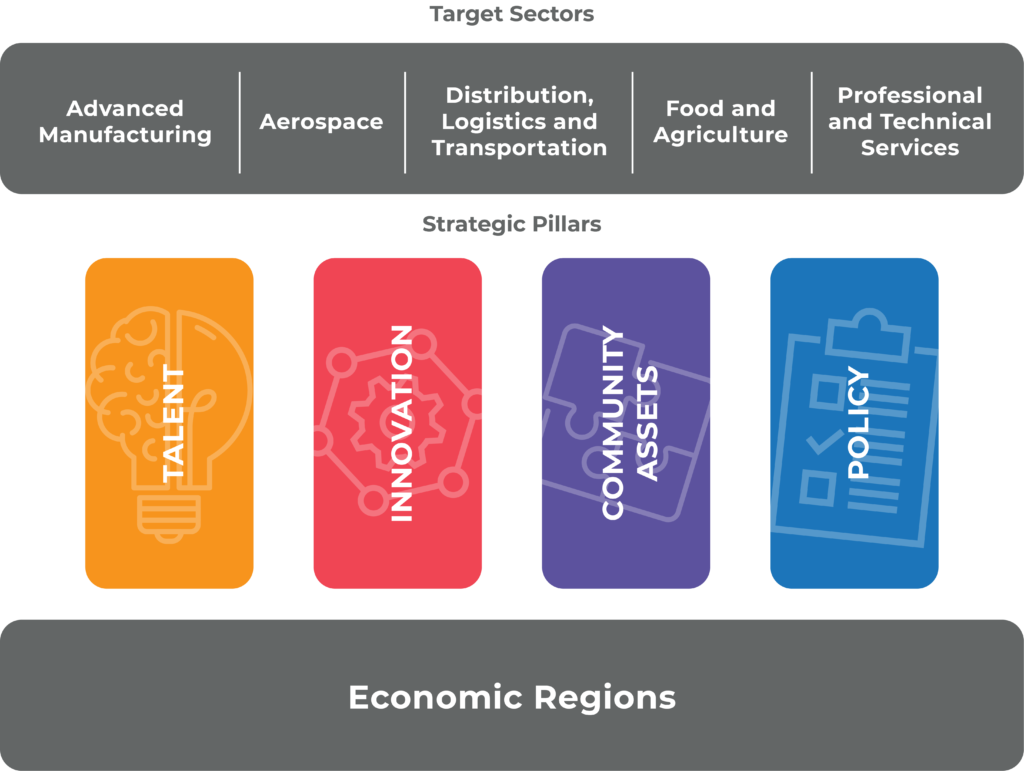Kansas Framework for Growth
Accelerating economic growth in Kansas
Accelerating economic growth in Kansas
Kansas is central to our nation in more than just geography. The industries that excel in Kansas are a steady, strong presence radiating from the heartland. Essentials like agriculture, manufacturing and logistics that make up a large portion of our economy have set Kansas on a stable economic path. Now, it’s time to stand on this solid foundation and reach new heights. The Kansas Framework for Growth is a plan to take our economy from stable to soaring in the next 15 years.
“The world is changing and accelerating every day, and therefore with urgency, we too must change.” – Kansas Governor Laura Kelly
Under the leadership of Governor Laura Kelly and Lieutenant Governor and Commerce Secretary David Toland, and in partnership with communities, businesses, academia and economic development partners across the state, Kansas now has its first comprehensive economic development strategy since 1986.

Our great people, communities, educational system and unique assets give Kansas a solid foundation for growth. While our sector mix is not aligned for future growth and resilience, with intentional action and investment, we can leverage our sectors into new opportunities through the development of modern skills and innovation. The Framework for Growth is grounded in four pillars:
TALENT | INNOVATION | COMMUNITY ASSETS | POLICY
Kansas is specialized in several major advanced manufacturing subsectors and is forecasted to have a higher five-year employment growth than both peers and the U.S. in all major advanced manufacturing subsectors.
Kansas has a proud history as an aerospace manufacturing leader. Looking ahead, Kansas has an opportunity to better align its world-class assets and competitive advantage in the aerospace industry with the subsectors that anticipate the most growth (i.e. guided missile and space vehicles and aircraft engine parts).
Kansas has a high level of employment and specialization in major subsectors such as trucking and warehousing, and we need to stay on the forefront of these global trends to continue capturing growth and providing jobs for our logistics workers. Our central geographic location and urban cores could also help win logistics deals that could attract businesses and jobs.
Kansas is globally recognized as a premier region for cattle product, but this heavy reliance on a single industry poses natural risks. Kansas must explore opportunities for further economic diversification while supporting the vibrancy and competitiveness of its Food and Agriculture sector. Further, the state must prepare and equip Kansas farmers and food manufacturing workers with new skills to succeed, including technical and analytical expertise.
While more traditionally known for industries such as agriculture and manufacturing, Kansans have developed a comparative advantage and experienced growth in the professional and technical services industries. To maintain and accelerate our growing leadership in this high-opportunity cluster, there are three broad approaches Kansas can pursue: doubling down on headquarters opportunities, supporting regional service hubs and centers of excellence and strengthening the digital backbone and talent pipeline.